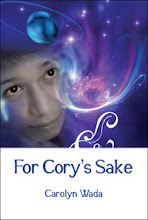Roci is the lifeblood of For Cory's Sake. Like biological "lifeblood," he is often not seen but is constantly there nonetheless, running through and giving vitality and even identity to the body.
As a character he's barely there. He exists as a character in six pages out of two hundred and twenty-four. As a concept, however, he drives everything. He is the singular thought from which every aspect of For Cory's Sake derives.
(I am not saying that the Bentlers' story is one of Roci's stories. I am not saying that. Read on for what I am saying . . . )
Roci is a child enslaved by fear and abuse, but he is not completely powerless. His super power is a strong imagination that allows, even compels, him to think of better "possibilities" than his bitter reality. And I thought it would be great if a child like Roci, with so much hope and faith, would have his world saved by people of whom he would approve, in a story with issues that he would find interesting and important. Thus Roci, or the thought of Roci, is the undercurrent driving the characters, issues and themes of For Cory's Sake.
Examples? All right . . .
Roci has not one family member. The family trying to save Roci's world has a lot of members.
Roci is a philosopher. (People have layers. Presents cost stuff) He would, I think, be interested in contrasts, like between weak fathers and strong fathers; and questions, such as which one is which?
Roci has had lots and lots of opportunities, in his real life, to think about the use of violence and fear as a means of control. And I think he would appreciate a story about people fighting fear with courage and vanquishing it with knowledge. (This theme, of course, is the biggie)
The brief nature of Roci's appearances was also purposeful. Roci was not interested in his barren reality. He was interested in what was being done about it. The bulk of For Cory's Sake concerned what was being done to try to change Roci's world.
I can see, now, that I was not transparent enough about all of the above. I put Roci on the front cover and the back cover of For Cory's Sake, then had him appear in only six pages out of two hundred and twenty-four. (And then I was surprised when two readers in the same day noted that the character of Roci seemed unnecessary, extraneous and irrelevant--sometimes I can be pretty dumb!)
I apologize for the confusion, and am making it right. Roci is not extraneous, but "intravenous" to For Cory's Sake. He is the thought that runs below the surface but enlivens the main "body" of For Cory's Sake, driving every major theme and literary decision within it!
As a character he's barely there. He exists as a character in six pages out of two hundred and twenty-four. As a concept, however, he drives everything. He is the singular thought from which every aspect of For Cory's Sake derives.
(I am not saying that the Bentlers' story is one of Roci's stories. I am not saying that. Read on for what I am saying . . . )
Roci is a child enslaved by fear and abuse, but he is not completely powerless. His super power is a strong imagination that allows, even compels, him to think of better "possibilities" than his bitter reality. And I thought it would be great if a child like Roci, with so much hope and faith, would have his world saved by people of whom he would approve, in a story with issues that he would find interesting and important. Thus Roci, or the thought of Roci, is the undercurrent driving the characters, issues and themes of For Cory's Sake.
Examples? All right . . .
Roci has not one family member. The family trying to save Roci's world has a lot of members.
Roci is a philosopher. (People have layers. Presents cost stuff) He would, I think, be interested in contrasts, like between weak fathers and strong fathers; and questions, such as which one is which?
Roci has had lots and lots of opportunities, in his real life, to think about the use of violence and fear as a means of control. And I think he would appreciate a story about people fighting fear with courage and vanquishing it with knowledge. (This theme, of course, is the biggie)
The brief nature of Roci's appearances was also purposeful. Roci was not interested in his barren reality. He was interested in what was being done about it. The bulk of For Cory's Sake concerned what was being done to try to change Roci's world.
I can see, now, that I was not transparent enough about all of the above. I put Roci on the front cover and the back cover of For Cory's Sake, then had him appear in only six pages out of two hundred and twenty-four. (And then I was surprised when two readers in the same day noted that the character of Roci seemed unnecessary, extraneous and irrelevant--sometimes I can be pretty dumb!)
I apologize for the confusion, and am making it right. Roci is not extraneous, but "intravenous" to For Cory's Sake. He is the thought that runs below the surface but enlivens the main "body" of For Cory's Sake, driving every major theme and literary decision within it!




Very complex character. I believe I know someone like this lol. Anyway, love how you constructed this layered and multifaceted individual.
ReplyDelete